Guillaume Apollinaire
Selected Poems
Translated by A. S. Kline © Copyright 2002 All Rights Reserved
This work may be freely reproduced, stored and transmitted, electronically or otherwise, for any non-commercial purpose. Conditions and Exceptions apply.
Contents
- The Mirabeau Bridge
- Twilight
- Clotilde
- The White Snow
- The Farewell
- Acrobats
- The Bells
- The Gypsy
- The Sign
- One Evening
- Moonlight
- Autumn Ill
- Hotels
- Hunting Horns
- Vitam Impendere Amori
- The Bestiary: or Orpheus’s Procession
- Apollinaire’s Notes to the Bestiary
- Index of First Lines
The Mirabeau Bridge
(Alcools: Le Pont Mirabeau)
Under the Mirabeau flows the Seine
And our amours
Shall I remember it again
Joy always followed after Pain
Comes the night sounds the hour
The days go by I endure
Hand in hand rest face to face
While underneath
The bridge of our arms there races
So weary a wave of eternal gazes
Comes the night sounds the hour
The days go by I endure
Love vanishes like the water’s flow
Love vanishes
How life is slow
And how Hope lives blow by blow
Comes the night sounds the hour
The days go by I endure
Let the hour pass the day the same
Time past returns
Nor love again
Under the Mirabeau flows the Seine
Comes the night sounds the hour
The days go by I endure
Twilight
(Alcools: Crépuscule)
Brushed by the shadows of the dead
On the grass where day expires
Columbine strips bare admires
her body in the pond instead
A charlatan of twilight formed
Boasts of the tricks to be performed
The sky without a stain unmarred
Is studded with the milk-white stars
From the boards pale Harlequin
First salutes the spectators
Sorcerers from Bohemia
Fairies sundry enchanters
Having unhooked a star
He proffers it with outstretched hand
While with his feet a hanging man
Sounds the cymbals bar by bar
The blind man rocks a pretty child
The doe with all her fauns slips by
The dwarf observes with saddened pose
How Harlequin magically grows
Clotilde
(Alcools: Clotilde)
The anemone and flower that weeps
have grown in the garden plain
where Melancholy sleeps
between Amor and Disdain
There our shadows linger too
that the midnight will disperse
the sun that makes them dark to view
will with them in dark immerse
The deities of living dew
Let their hair flow down entire
It must be that you pursue
That lovely shadow you desire
The White Snow
(Alcools: La blanche neige)
The angels the angels in the sky
One’s dressed as an officer
One’s dressed as a chef today
And the others sing
Fine sky-coloured officer
Sweet Spring when Christmas is long gone
Will deck you with a lovely sun
A lovely sun
The chef plucks geese
Ah! Snowfalls hiss
Fall and how I miss
My beloved in my arms
The Farewell
(Alcools: L’Adieu)
I’ve gathered this sprig of heather
Autumn is dead you will remember
On earth we’ll see no more of each other
Fragrance of time sprig of heather
Remember I wait for you forever
Acrobats
(Alcools:Saltimbanques)
The strollers in the plain
walk the length of gardens
before the doors of grey inns
through villages without churches
And the children gone before
The others follow dreaming
Each fruit tree resigns itself
When they signal from afar
They have burdens round or square
drums and golden tambourines
Apes and bears wise animals
gather coins as they progress
The Bells
(Alcools: Les Cloches)
My gipsy beau my lover
Hear the bells above us
We loved passionately
Thinking none could see us
But we so badly hidden
All the bells in their song
Saw from heights of heaven
And told it everyone
Tomorrow Cyprien Henry
Marie Ursule Catherine
The baker’s wife her husband
and Gertrude that’s my cousin
Will smile when I go by them
I won’t know where to hide
You far and I’ll be crying
Perhaps I shall be dying
The Gypsy
(Alcools: La tzigane)
The gypsy knew in advance
Our two lives star-crossed by night
We said farewell to her and then
from that deep well Hope began
Love heavy a performing bear
Danced upright when we wanted
And the blue bird lost his plumes
And the beggars lost their Ave
We knew quite well that we were damned
But hope of love in the street
Made us think hand in hand
Of what the Gypsy did foresee
The Sign
(Alcools: Signe)
I am bound to the King of the Sign of Autumn
Parting I love the fruits I detest the flowers
I regret every one of the kisses that I’ve given
Such a bitter walnut tells his grief to the showers
My Autumn eternal O my spiritual season
The hands of lost lovers juggle with your sun
A spouse follows me it’s my fatal shadow
The doves take flight this evening their last one
One Evening
(Alcools: Un soir)
An eagle descends from this sky white with archangels
And you sustain me
Let them tremble a long while all these lamps
Pray pray for me
The city’s metallic and it’s the only star
Drowned in your blue eyes
When the tramways run spurting pale fire
Over the twittering birds
And all that trembles in your eyes of my dreams
That a lonely man drinks
Under flames of gas red like a false dawn
O clothed your arm is lifted
See the speaker stick his tongue out at the listeners
A phantom has committed suicide
The apostle of the fig-tree hangs and slowly rots
Let us play this love out then to the end
Bells with clear chimes announce your birth
See
The streets are garlanded and the palms advance
Towards thee
Moonlight
(Alcools: Clair de Lune)
Mellifluent moon on the lips of the maddened
The orchards and towns are greedy tonight
The stars appear like the image of bees
Of this luminous honey that offends the vines
For now all sweet in their fall from the sky
Each ray of moonlight’s a ray of honey
Now hid I conceive the sweetest adventure
I fear stings of fire from this Polar bee
that sets these deceptive rays in my hands
And takes its moon-honey to the rose of the winds
Autumn Ill
(Alcools: Automne malade)
Autumn ill and adored
You die when the hurricane blows in the roseries
When it has snowed
In the orchard trees
Poor autumn
Dead in whiteness and riches
Of snow and ripe fruits
Deep in the sky
The sparrow hawks cry
Over the sprites with green hair the dwarfs
Who’ve never been loved
In the far tree-lines
the stags are groaning
And how I love O season how I love your rumbling
The falling fruits that no one gathers
The wind the forest that are tumbling
All their tears in autumn leaf by leaf
The leaves
You press
A crowd
That flows
The life
That goes
Hotels
(Alcools: Hôtels)
The room is free
Each for himself
A new arrival
Pays by the month
The boss is doubtful
Whether you’ll pay
Like a top
I spin on the way
The traffic noise
My neighbour gross
Who puffs an acrid
English smoke
O La Vallière
Who limps and smiles
In my prayers
The bedside table
And all the company
in this hotel
know the languages
of Babel
Let’s shut our doors
With a double lock
And each adore
his lonely love
Hunting Horns
(Alcools: Cors de chasse)
Our story’s noble as its tragic
like the grimace of a tyrant
no drama’s chance or magic
no detail that’s indifferent
makes our great love pathetic
And Thomas de Quincey drinking
Opiate poison sweet and chaste
Of his poor Anne went dreaming
We pass we pass since all must pass
Often I’ll be returning
Memories are hunting horns alas
whose note along the wind is dying
Vitam Impendere Amori
(Vitam Impendere Amori: To Threaten Life for Love)
Love is dead within your arms
Do you remember his encounter
He’s dead you restore the charms
He returns at your encounter
Another spring of springs gone past
I think of all its tenderness
Farewell season done at last
You’ll return as tenderly
◇◇◇◇
In the evening light that’s faded
Where our several loves brush by
Your memory lies enchained
Far from our shades that die
O hands bound by memory
Burning like a funeral pyre
Where the last black Phoenix
Perfection comes to respire
Link by link the chain wears thin
Deriding us your memory
Flies ah hear it you who rail
I kneel again at your feet
◇◇◇◇
You’ve not surprised my secret yet
Already the cortège moves on
But left to us is the regret
of there being no connivance none
The rose floats at the water’s edge
The maskers have passed by in crowds
It trembles in me like a bell
This heavy secret you ask now
◇◇◇◇
Evening falls and in the garden
Women tell their histories
to Night that not without disdain
spills their dark hair’s mysteries
Little children little children
Your wings have flown away
But you rose that defend yourself
Throw your unrivalled scents away
For now’s the hour of petty theft
Of plumes of flowers and of tresses
Gather the fountain jets so free
Of whom the roses are mistresses
◇◇◇◇
You descended through the water clear
I drowned my self so in your glance
The soldier passes she leans down
Turns and breaks away a branch
You float on nocturnal waves
The flame is my own heart reversed
Coloured as that comb’s tortoiseshell
The wave that bathes you mirrors well
◇◇◇◇
O my abandoned youth is dead
Like a garland faded
Here the season comes again
Of suspicion and disdain
The landscape’s formed of canvasses
A false stream of blood flows down
And under the tree the stars glow fresh
The only passer by’s a clown
The glass in the frame has cracked
An air defined uncertainly
Hovers between sound and thought
Between ‘to be’ and memory
O my abandoned youth is dead
Like a garland faded
Here the season comes again
Of suspicion and disdain
The Bestiary: or Orpheus’s Procession
(Le Bestiaire ou Cortège d’Orphée)
Orpheus
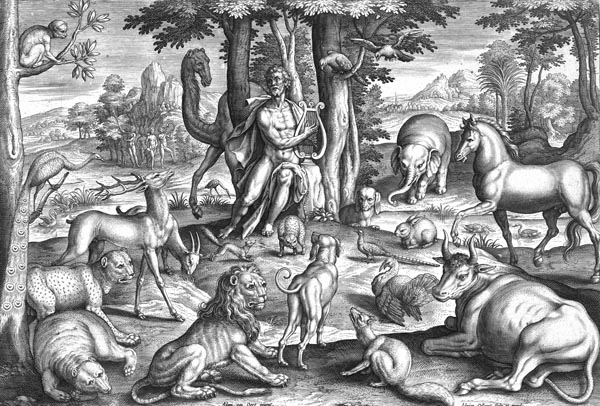
‘Orpheus, Making Music for the Animals’
Adriaen Collaert, 1570 - 1618, The Rijksmuseun
Admire the vital power
And nobility of line:
It’s the voice that the light made us understand here
That Hermes Trismegistus writes of in Pimander.
The Tortoise
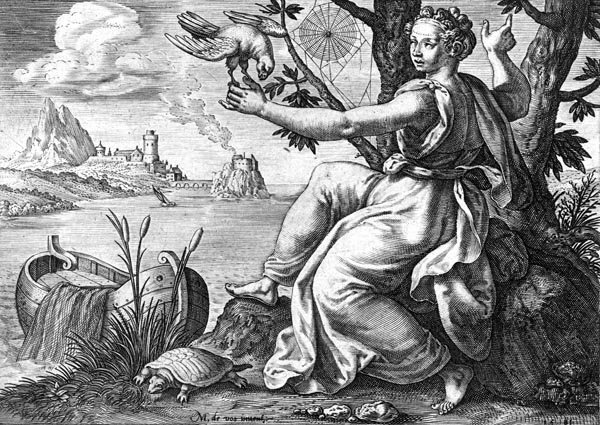
‘Feeling’
Raphaël Sadeler (I), 1581, The Rijksmuseun
From magic Thrace, O delerium!
My sure fingers sound the strings.
The creatures pass to the sounds
Of my tortoise, and the songs I sing.
The Horse
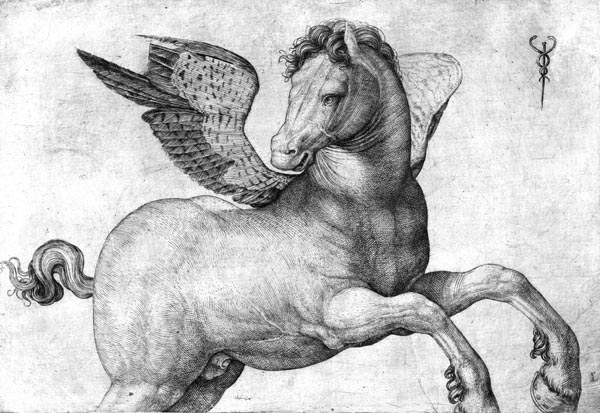
‘Pegasus’
Jacopo de' Barbari, 1509 - 1516, The Rijksmuseun
My harsh dreams knew the riding of you
My gold-charioted fate will be your lovely car
That for reins will hold tight to frenzy,
My verses, the patterns of all poetry.
The Tibetan Goat
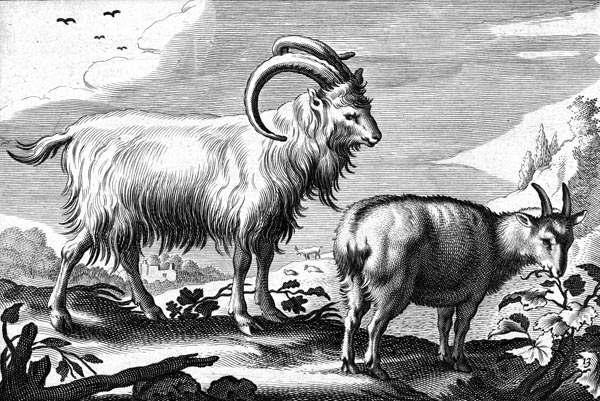
‘Hilly Landscape with Two Goats’
Reinier van Persijn, Jacob Gerritsz Cuyp, Nicolaes Visscher (I), 1641, The Rijksmuseun
The fleece of this goat and even
That gold one which cost such pain
To Jason’s not worth a sou towards
The tresses with which I’m taken.
The Serpent
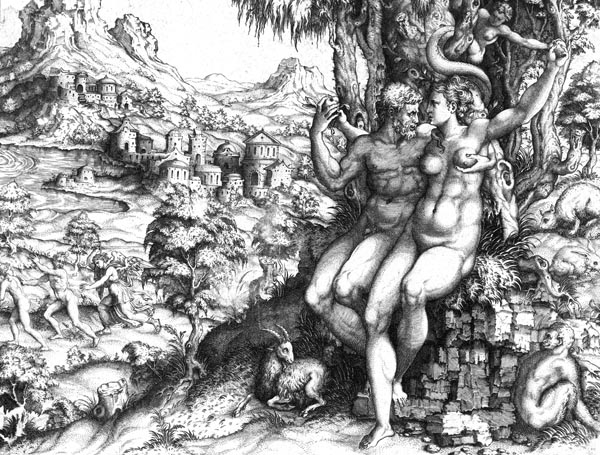
‘The Fall’
Anonymous, Hieronymus Cock, c. 1558 - c. 1570, The Rijksmuseun
You set yourself against beauty.
And how many women have been
victims of your cruelty!
Eve, Eurydice, Cleopatra:
I know three or four more after.
The Cat
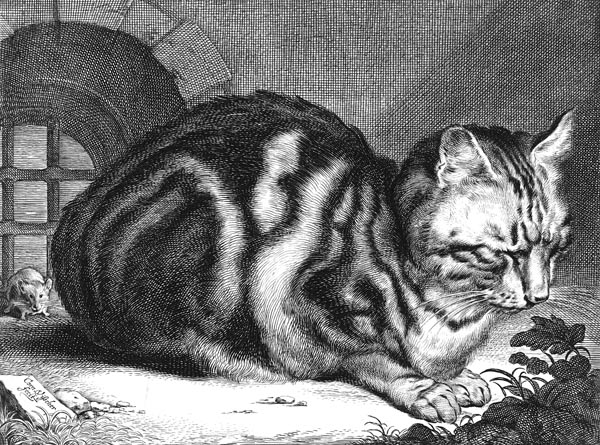
‘The Large Cat’
Cornelis Visscher (II), 1657, The Rijksmuseun
I wish there to be in my house:
A woman possessing reason,
A cat among books passing by,
Friends for every season
Lacking whom I’m barely alive.
The Lion
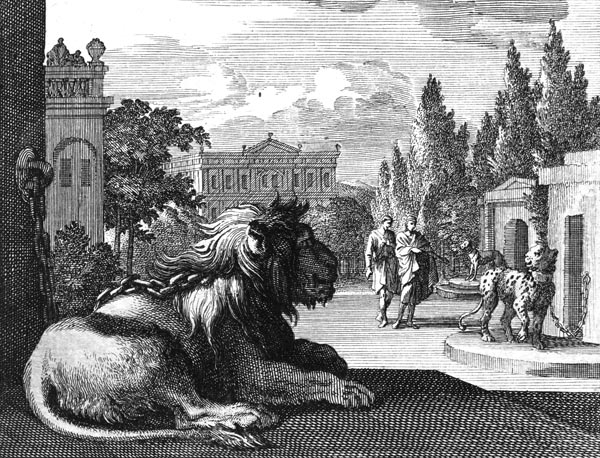
‘Wild Animals’
Caspar Luyken, Christoph Weigel, 1695 - 1705, The Rijksmuseun
O lion, miserable image
Of kings lamentably chosen,
Now you’re only born in a cage
In Hamburg, among the Germans.
The Hare
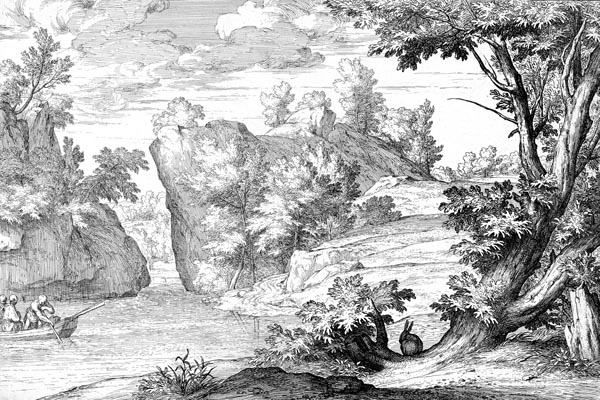
‘River Landscape with Hare’
Abraham Genoels, Adam Frans van der Meulen, Lodewijk XIV, 1650 - 1690, The Rijksmuseun
Don’t be fearful and lascivious
Like the hare and the amorous.
But always let your brain weave
The full form that conceives.
The Rabbit
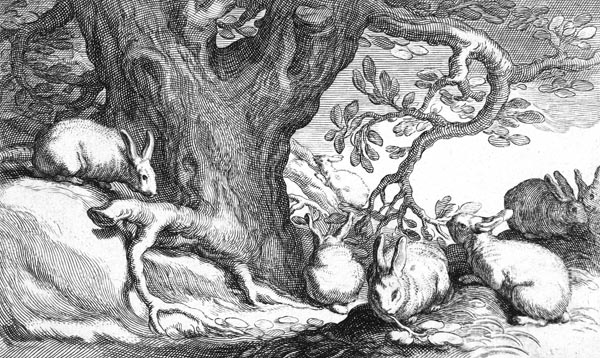
‘Rabbits’
Frederick Bloemaert, Abraham Bloemaert, Nicolaes Visscher (I), after 1635 - 1670, The Rijksmuseun
There’s another cony I remember
That I’d so like to take alive.
Its haunt is there among the thyme
In the valleys of the Land of Tender.
The Dromedary
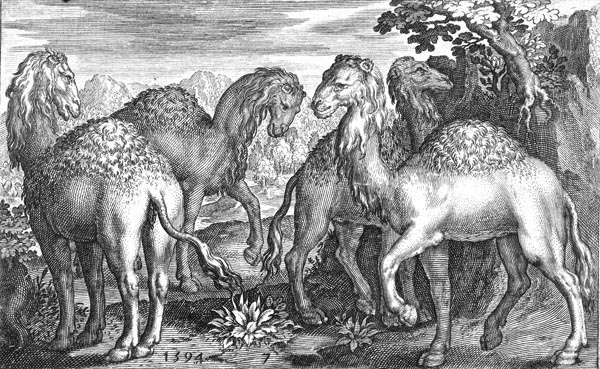
‘Four Dromedaries’
Nicolaes de Bruyn, 1594, The Rijksmuseun
With his four dromedaries
Don Pedro of Alfaroubeira
Travels the world and admires her.
He does what I would rather
If I’d those four dromedaries.
The Mouse
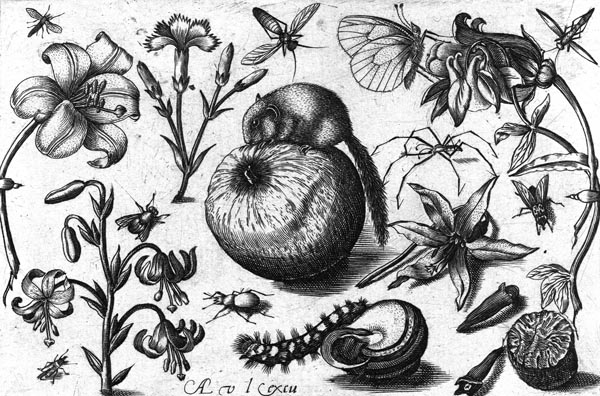
‘Flowers and a Mouse on an Apple’
Assuerus van Londerseel, 1594, The Rijksmuseun
Sweet days, the mice of time,
You gnaw my life, moon by moon.
God! I’ve twenty eight years soon,
and badly spent ones I imagine.
The Elephant
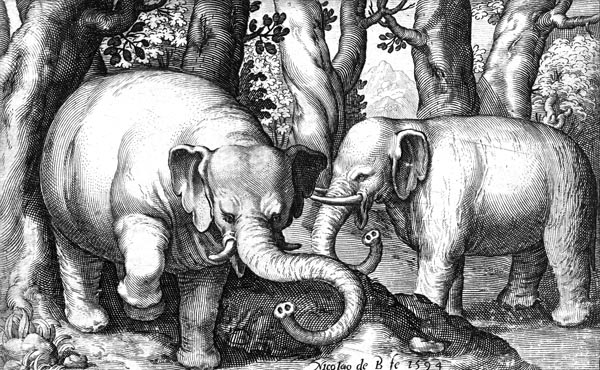
‘Two Elephants’
Nicolaes de Bruyn, 1594, The Rijksmuseun
I carry treasure in my mouth,
As an elephant his ivory.
At the price of flowing words,
Purple death!…I buy my glory.
Orpheus
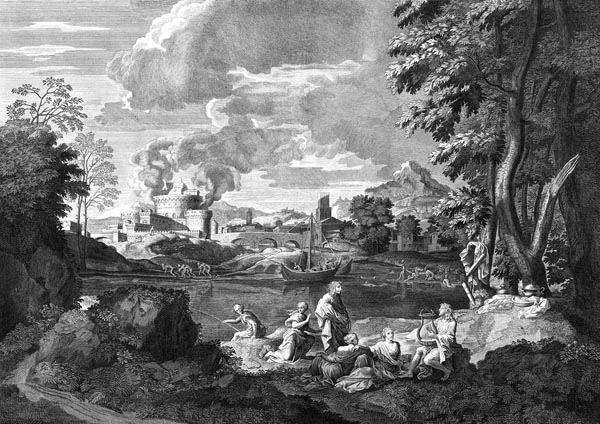
‘Orpheus and Eurydice’
Etienne Baudet, Nicolas Poussin, 1648 - 1711, The Rijksmuseun
Look at this pestilential tribe
Its thousand feet, its hundred eyes:
Beetles, insects, lice
And microbes more amazing
Than the world’s seventh wonder
And the palace of Rosamunde!
The Caterpillar
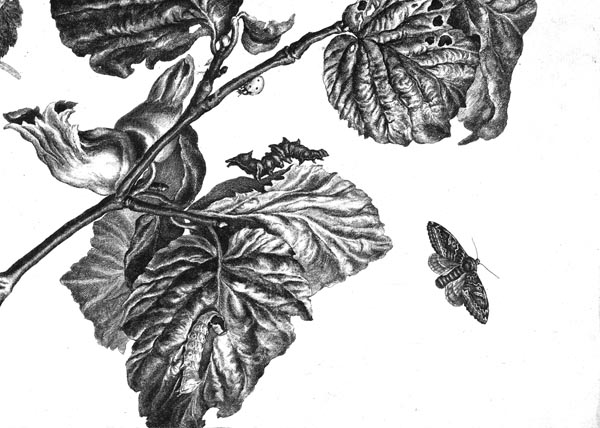
‘Plants, Caterpillars and Insects’
Jacob l' Admiral (II), Johannes Sluyter, 1710 - 1770, The Rijksmuseun
Work leads us to riches.
Poor poets, work on!
The caterpillar’s endless sigh
Becomes the lovely butterfly.
The Fly
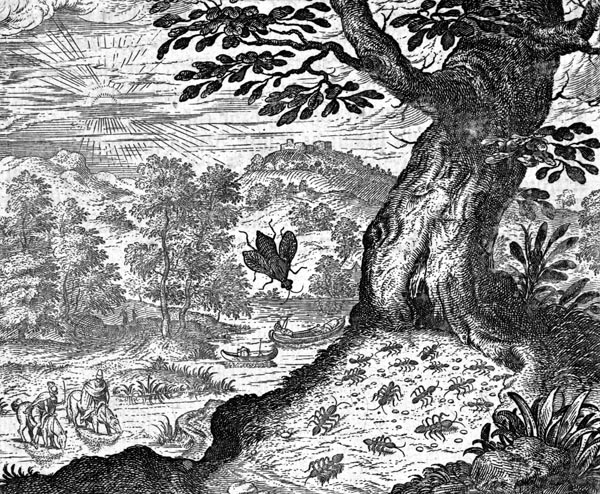
‘The Fable of the Ant and the Fly’
Aegidius Sadeler, Marcus Gheeraerts (I), Marcus Gheeraerts (I), 1608, The Rijksmuseun
The songs that our flies know
Were taught to them in Norway
By flies who are they say
Divinities of snow.
The Flea
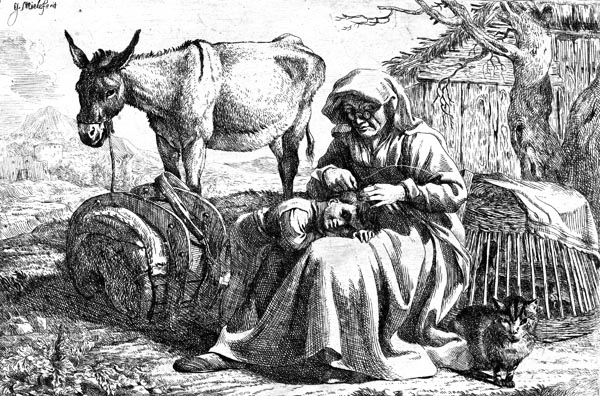
‘Old Woman Picking Flea's from a Child's Head’
Jan Miel, 1599 - 1664, The Rijksmuseun
Fleas, friends, lovers too,
How cruel are those who love us!
All our blood pours out for them.
The well-beloved are wretched then.
The Grasshopper
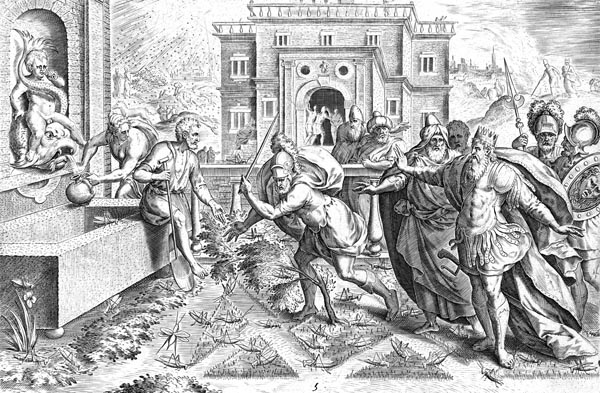
‘The Plagues of Locusts and Water Turned to Blood’
Jan Miel, 1599 - 1664, The Rijksmuseun
Here’s the slender grasshopper
The food that fed Saint John.
May my verse be similar,
A treat for the best of men.
Orpheus
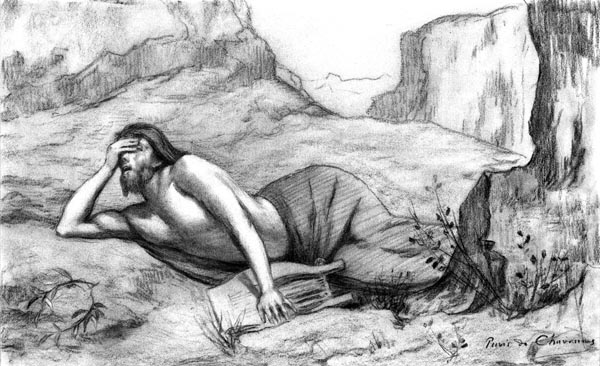
‘Orpheus’
Pierre -Cécile Puvis de Chavannes, French, 1824 – 1898, Yale University Art Gallery
His heart was the bait: the heavens were the pond!
For, fisherman, what fresh or seawater catch
equals him, either in form or savour,
that lovely divine fish, Jesus, My Saviour?
The Dolphin
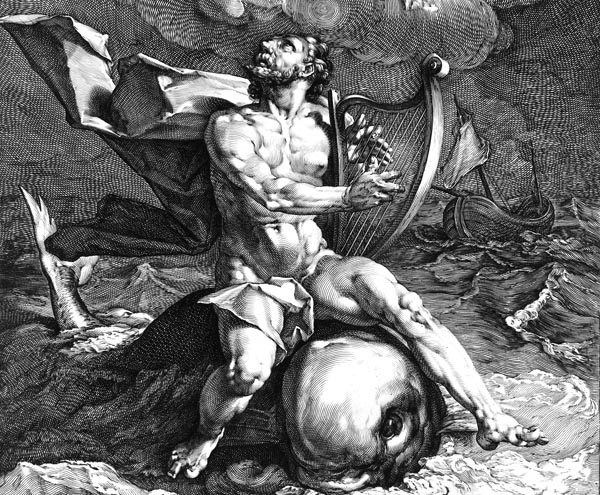
‘Arion on the Dolphin’
Jan Harmensz. Muller, Harmen Jansz Muller, 1589, The Rijksmuseun
Dolphins, playing in the sea
The wave is bitter gruel.
Does my joy sometimes erupt?
Yet life is still so cruel.
The Octopus
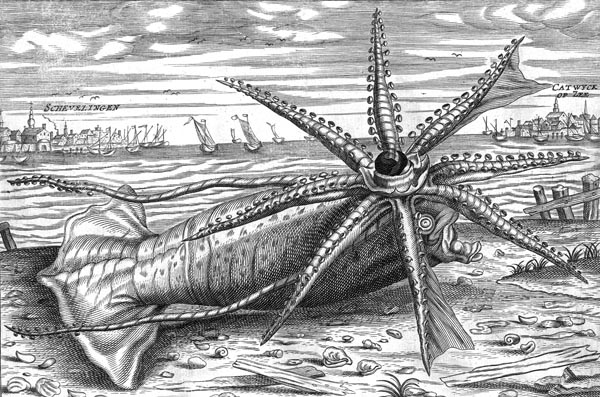
‘Sea Monster’
Anonymous, 1661, The Rijksmuseun
Hurling his ink at skies above,
Sucking the blood of what he loves
And finding it delicious,
Is myself the monster, vicious.
The Jellyfish
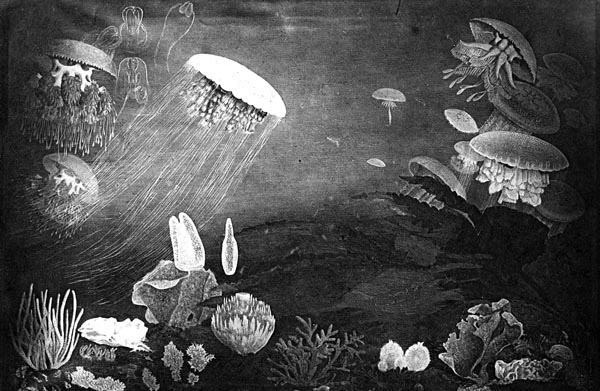
‘Medusæ’
Descriptive Catalogue of the Medusæ of the Australian Seas, Lendenfeld, R. von (Robert), p39 1887, Internet Book Archive Images
Medusas, miserable heads
With hairs of violet
You enjoy the hurricane
And I enjoy the very same.
The Lobster
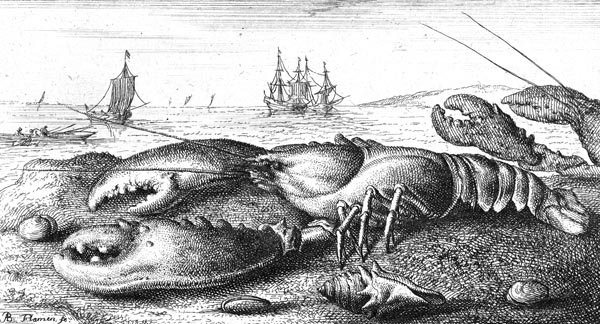
‘Lobster on the Beach’
Albert Flamen, 1664, The Rijksmuseun
Uncertainty, O my delights
You and I we go
As lobsters travel onwards, quite
Backwards, Backwards, O.
The Carp
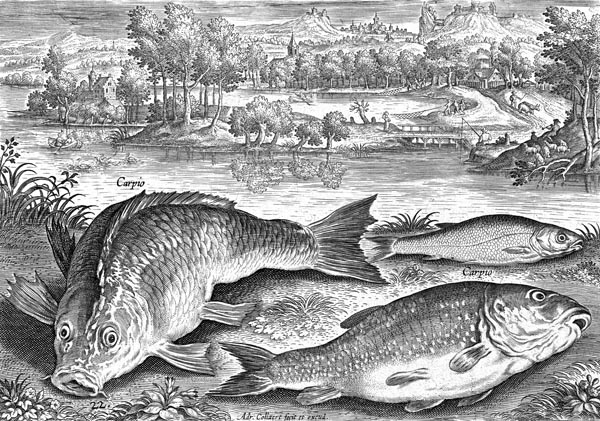
‘Three Carp on a Shore’
Adriaen Collaert, after 1598 - 1618, The Rijksmuseun
In your pools, and in your ponds,
Carp, you indeed live long!
Is it that death forgets to free
You fishes of melancholy?
Orpheus
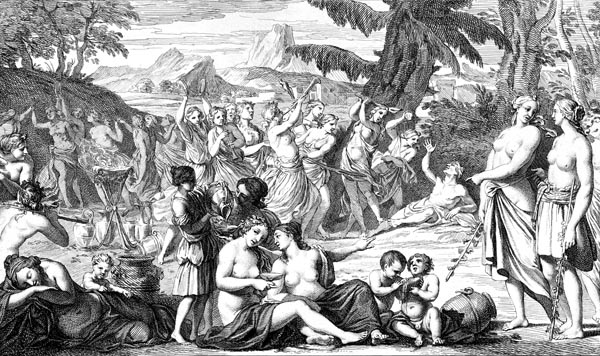
‘The Death of Orpheus’
Nicolaes de Bruyn, 1594, The Rijksmuseun
The female of the Halcyon,
Love, the seductive Sirens,
All know the fatal songs
Dangerous and inhuman.
Don’t listen to those cursed birds
But Paradisial Angels’ words.
The Sirens
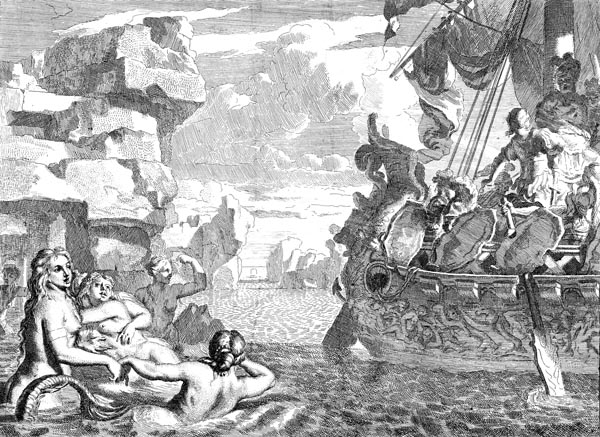
‘Odysseus and the Sirens’
Johannes Glauber, Gerard de Lairesse, 1656 - 1726, The Rijksmuseun
Do I know where your ennui’s from, Sirens,
When you grieve so widely under the stars?
Sea, I am like you, filled with broken voices,
And my ships, singing, give a name to the years.
The Dove
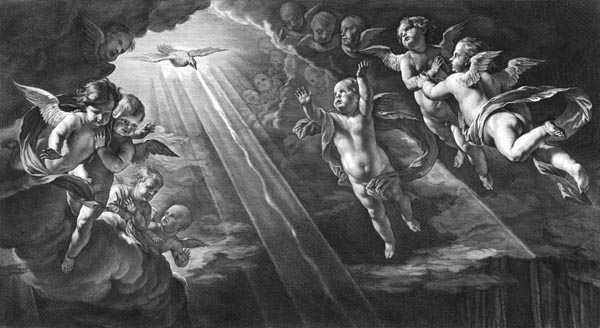
‘Angels and Holy Spirit (Annunciation)’
Nicolas Pitau (I), Philippe de Champaigne, 1642 - 1671, The Rijksmuseun
Dove, both love and spirit
Who engendered Jesus Christ,
Like you I love a Mary.
And so with her I marry.
The Peacock
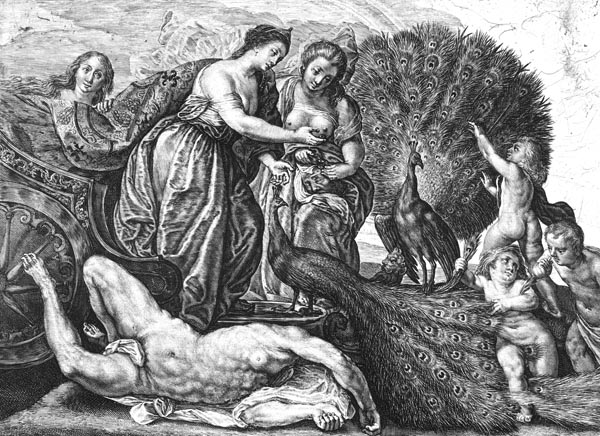
‘Juno and the Peacock’
Magdalena van de Passe, Peter Paul Rubens, 1617 - 1634, The Rijksmuseun
In spreading out his fan, this bird,
Whose plumage drags on earth, I fear,
Appears more lovely than before,
But makes his derrière appear.
The Owl
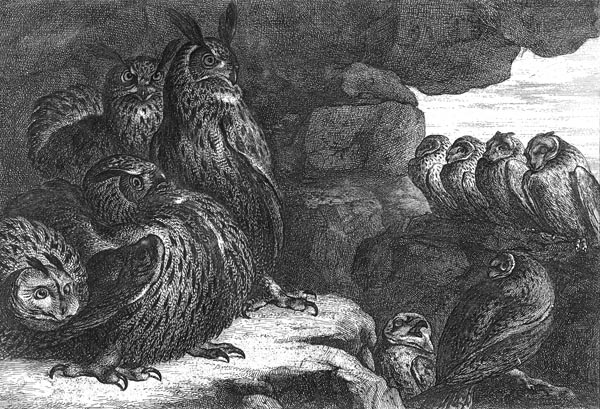
‘Owls in a Cave’
Magdalena van de Passe, Peter Paul Rubens, 1617 - 1634, The Rijksmuseun
My poor heart’s an owl
One woos, un-woos, re-woos.
Of blood, of ardour, he’s the fowl.
I praise those who love me, too.
The Ibis
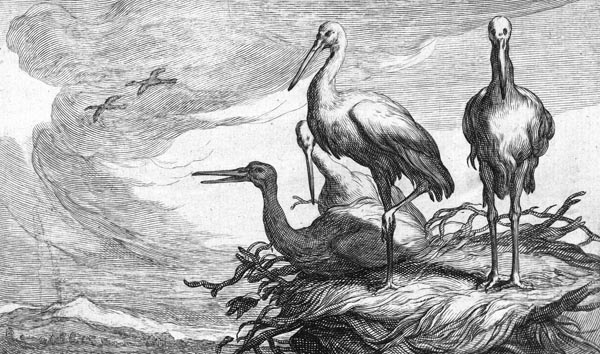
‘Storks in a Nest’
Magdalena van de Passe, Peter Paul Rubens, 1617 - 1634, The Rijksmuseun
Yes, I’ll pass fearful shadows
O certain death, let it be so!
Latin mortal dreadful word,
Ibis, Nile’s native bird.
The Ox
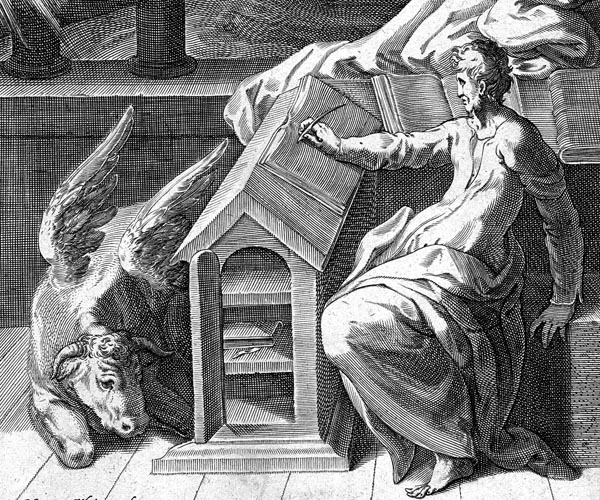
‘Lucas and the Ox’
Hieronymus Wierix, 1563 - before 1590, The Rijksmuseun
This cherubim sings the praises
Of Paradise where, with Angels,
We’ll live once more, dear friends,
When the good God intends.
Apollinaire’s Notes to the Bestiary
Admire the vital power
And nobility of line:
It praises the line that forms the images, marvellous ornaments to this poetic entertainment.
It’s the voice that the light made us understand here
That Hermes Trismegistus writes of in Pimander.
‘Soon’ we read in the Pimander, ‘they descend into the shadows….and an inarticulate cry rises from there that seems the voice of light.’
Is not this ‘voice of light’ the design, that is to say the line?
And where the light fully expresses all its colour. Painting is truly a luminous language.
From magic Thrace
Orpheus was a native of Thrace. That sublime poet played on a lyre that Mercury gave him. It was made from the shell of a tortoise, stuck round with leather, with two horns and a sounding board and strings made from sheep’s gut. Mercury gave these lyres to both Apollo and Amphion. When Orpheus played and sang, the wild animals themselves came to hear his singing. Orpheus invented all the sciences, all the arts. Grounded in magic he knew the future and predicted the Christian coming of the Saviour.
My harsh dreams knew the riding of you
My gold-charioted fate will be your lovely car
Bellerephon was the first to ride Pegasus when he attacked the Chimaera. There are many chimaeras that exist today, and before combating one of them, the greatest enemies of poetry, it is necessary to bridle Pegasus and even yoke him. One knows well what I wish to say.
The full form that conceives.
In the lair (the form) of the female hare superfetation (second conception during gestation) is possible.
With his four dromedaries
Don Pedro of Alfaroubeira
Travels the world and admires her.
The celebrated travel book entitled: ‘History of Prince Don Pedro of Portugal, in which is told what happened to him on the way composed for Gomez of Santistevan when he had covered the seven regions of the globe, one of the twelve who bore the prince company’, reports that the Prince of Portugal, Don Pedro of Alfaroubeira, set out with twelve companions to visit the seven regions of the world. These travellers were mounted on four dromedaries, and having passed through Spain, they went to Norway and from there to Babylon and the Holy Land. The Portuguese prince even visited the Kingdoms of Prester John and returned to his own country after three years and four months.
And the palace of Rosamunde.
Here, regarding the palace, and a testimony of the love that the King of England possessed for his mistress, is this quatrain from a poem whose Author I do not know.
‘To shelter Rosamunde from hate
borne her by the queen,
the king had a palace made
such as had ne’er been seen’.
By the flies who are they say
Divinities of snow.
All have not appeared in the form of snowflakes but many have been tamed by the Finnish or Lapp sorcerers and obey them. The magicians pass them from father to son and keep them imprisoned in a box where they are invisible, ready to fly out in a swarm and torment thieves, sounding out magic words, so they themselves are immortal.
Here’s the slender grasshopper
The food that fed Saint John.
‘And John was clothed with camel’s hair, and with a girdle of a skin about his loins: and he did eat locusts and wild honey.’ Mark 1.6
The female of the Halcyon,
Love, the seductive Sirens,
All know the fatal songs
Dangerous and inhuman.
The sailors, hearing the female Halycon sing, prepared to die, safe however around mid-December, when these birds make their nests, and one knows that then the sea will be calm. Like Love and the Sirens, these birds sing so melodiously that even the life of those who hear them is not too great a price to pay for such music.
This cherubim
One may distinguish among the angelic hierarchies, vowed to the service and glory of the divine, beings with unknown forms and the most amazing beauty. The cherubim are winged oxen, but in no way monstrous.
When the good God intends.
Those who practice poetry search for and love only the perfection that is God Himself. And will this divine grace, this supreme perfection depart those for whom life exists only to discover and glorify them? That seems impossible, and, to my mind, poets have the right to hope after their death for the everlasting happiness that obtains complete knowledge of God, that is to say of the sublime beauty.
Index of First Lines
- Under the Mirabeau flows the Seine
- Brushed by the shadows of the dead
- The anemone and flower that weeps
- The angels the angels in the sky
- I’ve gathered this sprig of heather
- The strollers in the plain
- My gipsy beau my lover
- The gypsy knew in advance
- I am bound to the King of the Sign of Autumn
- An eagle descends from this sky white with archangels
- Mellifluent moon on the lips of the maddened
- Autumn ill and adored
- The room is free
- Our story’s noble as its tragic
- Love is dead within your arms
- In the evening light that’s faded
- You’ve not surprised my secret yet
- Evening falls and in the garden
- You descended through the water clear
- O my abandoned youth is dead
- Admire the vital power
- From magic Thrace, O delerium!
- My harsh dreams knew the riding of you
- The fleece of this goat and even
- You set yourself against beauty.
- I wish there to be in my house:
- O lion, miserable image
- Don’t be fearful and lascivious
- There’s another cony I remember
- With his four dromedaries
- Sweet days, the mice of time,
- I carry treasure in my mouth,
- Look at this pestilential tribe
- Work leads us to riches.
- The songs that our flies know
- Fleas, friends, lovers too,
- Here’s the slender grasshopper
- His heart was the bait: the heavens were the pond!
- Dolphins, playing in the sea
- Hurling his ink at skies above,
- Medusas, miserable heads
- In your pools, and in your ponds,
- The female of the Halcyon,
- Do I know where your ennui’s from, Sirens,
- Dove, both love and spirit
- In spreading out his fan, this bird,
- My poor heart’s an owl
- Yes, I’ll pass fearful shadows
- This cherubim sings the praises